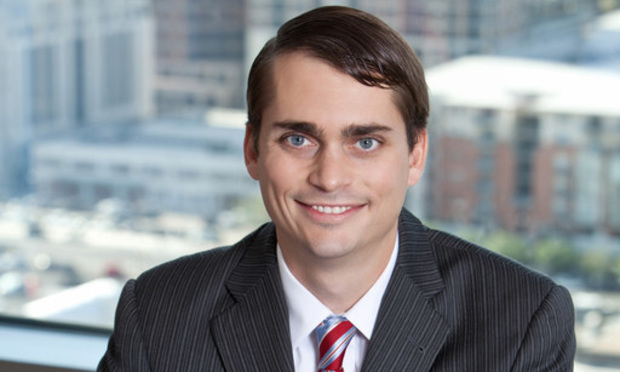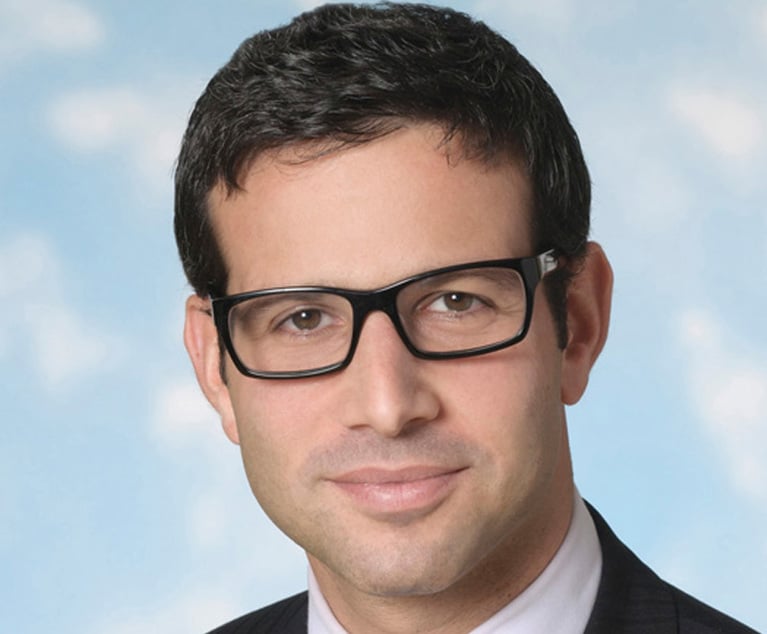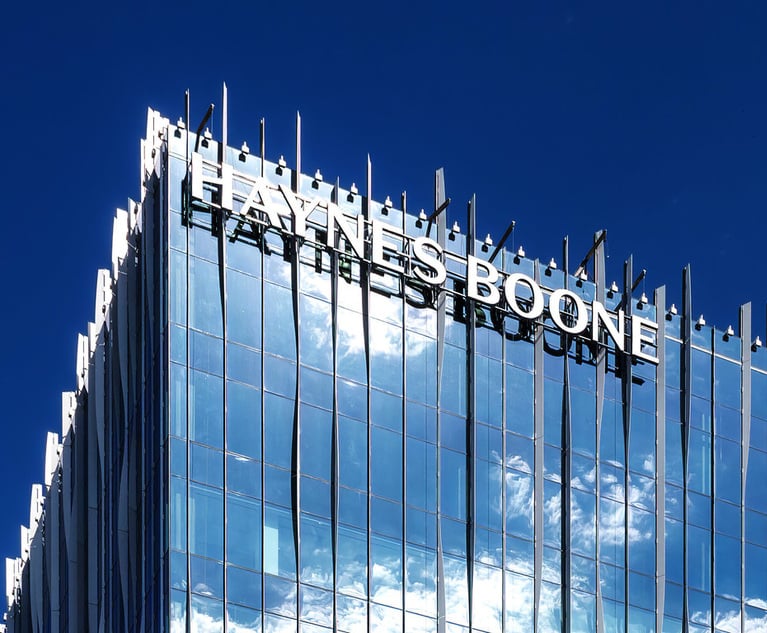On the Rise 2018: Josh Budwin
Josh Budwin, principal, McKool Smith
August 31, 2018 at 06:00 AM
7 minute read
 Josh Budwin, with McKool Smith.
Josh Budwin, with McKool Smith.
Josh Budwin, principal, McKool Smith
Experience:
- McKool Smith; 2005-present
- Summer Associate, Summer 2004
Education:
- Temple University Beasley School of Law, 2005
- Rensselaer Polytechnic Institute, 2002
What drew you to a career in law?
As an engineering undergraduate student, I had a summer internship working in a computer lab managing a bank of servers that worked in a distributed computing environment (harvesting the combined power of various different computers and servers to model complex computing problems – in this case, drug interactions). As part of that, I was required to work in a high security lab with very few other people, surrounded by computers, all of which required the room to be air conditioned to 55 degrees. So, even in the height of summer when I came into the lab, I was required to wear a heavy coat and didn't have much human interaction. I wasn't happy, and figured I didn't see myself working in this environment for a career. As such, I started searching for other ways to leverage my engineering degree and fell back on the law. My mom always told me that I'd make a good lawyer since I was an argumentative child. Falling back on that was a natural next step.
Have you set a specific goal that you want to achieve in the next year?
My firm colleagues and I are in the midst of representing TiVo subsidiaries Rovi and Veveo against Comcast in an International Trade Commission (ITC) investigation involving numerous patents related to interactive search, interactive television program guides, DVR technology, and related technologies. Our goal is to obtain a successful result for our client at a hearing scheduled for October.
What has been your proudest career moment and your biggest hurdle?
Proudest: I was part of a team that successfully represented Versata in obtaining a $391 million jury verdict in a patent infringement lawsuit alleging infringement by SAP of Versata's pricing software patents. That verdict (along with pre- and post-judgment interest) was affirmed by the Federal Circuit on appeal. The U.S. Supreme Court denied cert. However, getting to that point was very difficult. After prevailing in the first jury trial on all issues, our damages award was vacated. As such, we had to go back for a second jury trial on damages – and, in the second trial actually obtained a greater damages award than the first trial!
Biggest Hurdle: We represented ParkerVision in a two-part jury trial against Qualcomm. As part of this trial, the judge bifurcated liability and damages (meaning, first we tried liability to the jury, then after prevailing on that, we tried damages to the same jury). First, we won the liability phase – with the jury finding that Qualcomm infringed ParkerVisions's patents. Second, we won the damages phase – with the jury awarding our client $173 million in damages. Then, nearly a year after we prevailed on the jury verdict, the trial judge granted judgment as a matter of law of non-infringement which the Federal Circuit summarily affirmed in a Rule 36 opinion.
Where do you fit on a 1-10 work-life balance scale with 10 being nirvana? Please explain.
When I first started working, I was certainly at the lower-end of this scale – working a lot, and not having the greatest work-life balance. Now (especially since I have two small children, ages 3 and 6), I definitely have a much better work-life balance, owing a lot to the great team I am blessed to work with. I had a close law school friend who just got married in Greece. Despite being in the midst of a super busy ITC matter for a client, my wife and I were able to attend the wedding. Given the long hours and high-stress nature of this job, I find it is very important to be able to step away and take “mental sanity” breaks. I encourage my team and those I work with to do the same (with varying degrees of success).
What is the top quality that you've used to succeed in the profession?
A client once told me that it's a combination of extreme technical competence that allows me to fully understand the specifics of any technology case, along with my real world skill at reading people and exposing falsehoods during cross-examination. Most engineers aren't people persons—they know how things work, not how people behave and interact. The ability to understand the technical details of highly complex inventions and products, combined with the ability to explain these concepts to judges, juries and others has been an asset throughout my career.
Who is your favorite mentor and why?
I have two that I need to mention. A law school professor, Bob Bramson, taught my patent licensing class and took me under his wing. He was instrumental in helping me obtain employment at McKool Smith. When I left Philadelphia for Texas, he told me that I'd meet a nice Texas girl and never return to Philadelphia – he was correct! I was in Texas less than two months when I met my wife. I also need to mention my colleague, Rod Dorman. Rod is who I aspire to be “when I grow up.” He has been practicing law for 40 years and has overcome a number of challenges. Notwithstanding his long career, he always has an amazing and upbeat attitude on life and the practice of law, and really manages to live life the fullest – including having an admirable work/life balance.
What's the best advice anyone has ever given you?
Follow your passion, not the money. If you take the time to determine what you love to do and how you wish to spend each day, and if you conform your career to that guidepost, you will nearly always be successful. Also, never underestimate the power of understatement. Lesser legal briefs are filled with overstatement, hyperbole, and adjectives that turn judges off and are unnecessary when you have the winning argument.
What trends are you observing in the profession that you're excited about?
In last 10 years, inventors and IP holders have been somewhat vilified – all (or many) painted with the broad brush of the “patent troll” label. This has caused changes in the law and the eyes of fact finders (judges and juries) that causes them to look much more skeptically at IP holders and inventors than has traditionally been the case in the history of the United States. Thankfully, and hopefully, the pendulum seems to be starting to swing (at least slightly) back to a more balanced view of the law and policy concerning the rights of IP holders and inventors.
What is the greatest challenge you see for the legal profession?
Providing affordable access to the justice system which is oftentimes, especially in high-stakes IP fights, tilted towards those entities that have the deepest pockets enabling them to hire teams of high priced lawyers.
This content has been archived. It is available through our partners, LexisNexis® and Bloomberg Law.
To view this content, please continue to their sites.
Not a Lexis Subscriber?
Subscribe Now
Not a Bloomberg Law Subscriber?
Subscribe Now
NOT FOR REPRINT
© 2025 ALM Global, LLC, All Rights Reserved. Request academic re-use from www.copyright.com. All other uses, submit a request to [email protected]. For more information visit Asset & Logo Licensing.
You Might Like
View All
Kirkland's Daniel Lavon-Krein: Staying Ahead of Private Equity Consolidation

Vinson & Elkins: Traditional Energy Practice Meets Energy Transition
4 minute read
Advising 'Capital-Intensive Spaces' Fuels Corporate Practice Growth For Haynes and Boone
4 minute read
Get to Know Texas Lawyer's Attorney of the Year Finalists
Trending Stories
- 1Latham's Lateral Hiring Picks Up Steam, With Firm Adding Simpson Practice Head, Private Equity GC
- 2Legal Restrictions Governing Artificial Intelligence in the Workplace
- 3Failure to Adequately Inform Patients
- 4'FTX' One Year Later: The Impact on Examiner Practice in Bankruptcy Courts
- 5Gen AI Legal Contract Startup Ivo Announces $16 Million Series A Funding Round
Who Got The Work
J. Brugh Lower of Gibbons has entered an appearance for industrial equipment supplier Devco Corporation in a pending trademark infringement lawsuit. The suit, accusing the defendant of selling knock-off Graco products, was filed Dec. 18 in New Jersey District Court by Rivkin Radler on behalf of Graco Inc. and Graco Minnesota. The case, assigned to U.S. District Judge Zahid N. Quraishi, is 3:24-cv-11294, Graco Inc. et al v. Devco Corporation.
Who Got The Work
Rebecca Maller-Stein and Kent A. Yalowitz of Arnold & Porter Kaye Scholer have entered their appearances for Hanaco Venture Capital and its executives, Lior Prosor and David Frankel, in a pending securities lawsuit. The action, filed on Dec. 24 in New York Southern District Court by Zell, Aron & Co. on behalf of Goldeneye Advisors, accuses the defendants of negligently and fraudulently managing the plaintiff's $1 million investment. The case, assigned to U.S. District Judge Vernon S. Broderick, is 1:24-cv-09918, Goldeneye Advisors, LLC v. Hanaco Venture Capital, Ltd. et al.
Who Got The Work
Attorneys from A&O Shearman has stepped in as defense counsel for Toronto-Dominion Bank and other defendants in a pending securities class action. The suit, filed Dec. 11 in New York Southern District Court by Bleichmar Fonti & Auld, accuses the defendants of concealing the bank's 'pervasive' deficiencies in regards to its compliance with the Bank Secrecy Act and the quality of its anti-money laundering controls. The case, assigned to U.S. District Judge Arun Subramanian, is 1:24-cv-09445, Gonzalez v. The Toronto-Dominion Bank et al.
Who Got The Work
Crown Castle International, a Pennsylvania company providing shared communications infrastructure, has turned to Luke D. Wolf of Gordon Rees Scully Mansukhani to fend off a pending breach-of-contract lawsuit. The court action, filed Nov. 25 in Michigan Eastern District Court by Hooper Hathaway PC on behalf of The Town Residences LLC, accuses Crown Castle of failing to transfer approximately $30,000 in utility payments from T-Mobile in breach of a roof-top lease and assignment agreement. The case, assigned to U.S. District Judge Susan K. Declercq, is 2:24-cv-13131, The Town Residences LLC v. T-Mobile US, Inc. et al.
Who Got The Work
Wilfred P. Coronato and Daniel M. Schwartz of McCarter & English have stepped in as defense counsel to Electrolux Home Products Inc. in a pending product liability lawsuit. The court action, filed Nov. 26 in New York Eastern District Court by Poulos Lopiccolo PC and Nagel Rice LLP on behalf of David Stern, alleges that the defendant's refrigerators’ drawers and shelving repeatedly break and fall apart within months after purchase. The case, assigned to U.S. District Judge Joan M. Azrack, is 2:24-cv-08204, Stern v. Electrolux Home Products, Inc.
Featured Firms
Law Offices of Gary Martin Hays & Associates, P.C.
(470) 294-1674
Law Offices of Mark E. Salomone
(857) 444-6468
Smith & Hassler
(713) 739-1250






